Facepalming through Gethsemane
Babylon 5 frequently took time out from the space opera of empires and battles to discuss questions of philosophy, religion, and spirituality. The two were played into each other, and this was one of the show's great strengths — the intergalactic struggle kept the spiritual and philosophical discussions from being abstract, and the conflicts of belief gave a greater sense of gravitas and consequence to the battles. It was only because of something the Minbari believed that they stopped short of wiping humanity out in a war. One of the most powerful moments of television I can remember is seeing the look on Londo Mollari's face as he watches the Narn homeworld being bombed by asteroids launched from Centauri ships at the end of the war he started. His lust for power made him an ideal pawn of the Shadows, the aliens trying to foster wars between races. As he watches in horror, a passing ship slides a shadow over his own face. If it weren't for the depth of the universe that J. Michael Straczynski had put together, the scene wouldn't have had that impact. I'd put a screenshot here, but unless you've seen the first two series, it's just a picture of a bloke standing with his mouth open against a CGI backdrop.
In that context, then, it's not a huge surprise when a bunch of monks arrive on the station from Earth, with the stated aim of "learning all the names and faces of God from our non-human brothers". Now, this a group of people who allegedly follow Jesus Christ, the guy who in the space of a single conversation said things like "I am the way and the truth and the life. No one comes to the Father except through me," and "Anyone who has seen me has seen the Father" (John 14:5-11). In that context their mission is, to put it mildly, highly questionable. They'd do well to read Paul's letter to the Colossians, where he explains that through Jesus full wisdom and maturity as God's people is made possible. The monks don't feature heavily, in most episodes you might just catch a glimpse of someone wearing a habit in the back of a shot of a crowded area, particularly in the poorer parts of the station where they moved in. But there are a few episodes that put them front and centre.
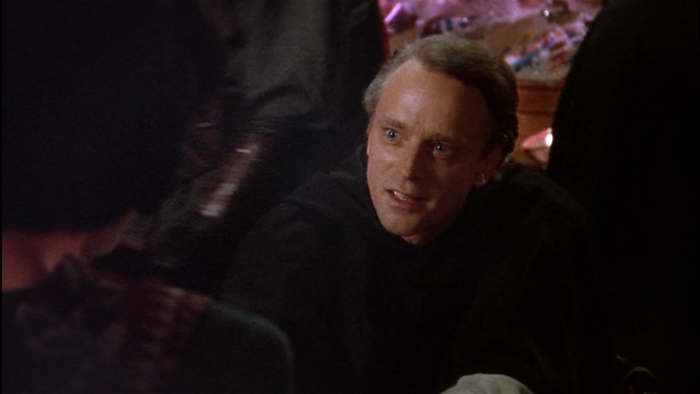
Brother Edward: Monk and Data Analyst
(All images/video: Warner Bros)
One of these is Passing through Gethsemane, from the third series. The central character is a monk called Brother Edward, who's the only one to actually engage in the monks' mission on-screen, when he visits Delenn and Lennier to ask them about Minbari religion. As well as discussing issues of belief in this straightforward way, the episode comes at it from another angle. Brother Edward turns out to be a serial killer. As punishment, his mind was wiped and he was given a new, false set of memories and a desire to help others which led to him becoming a monk. He finds out about this because the families of his victims want their revenge, and want him to remember what he did before they kill him, and so they employ a Centauri telepath to remove the mental blocks that keep his old memories locked away. Once he realizes what he did in the past he's racked with guilt and questions the state of his soul.
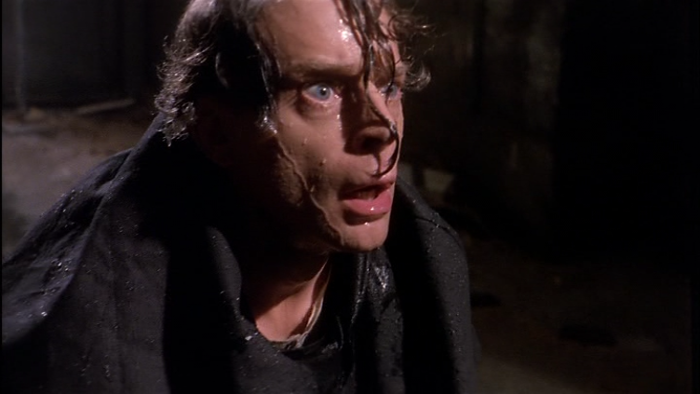
Edward remembering his past
As an aside, this also turns out to be a reference to a story by H. P. Lovecraft. Given that the character's original name was Charles Dexter, and his now called Brother Edward, we have a clear pointer to Lovecraft's story The Case of Charles Dexter Ward, which is also a story about someone who isn't who they claim to be. In that story, Ward is the descendent of an eighteenth-century sorcerer called Joseph Curwen, to whom he has a striking resemblance. Ward begins studying his ancestor's magic, which included temporarily raising the dead in order to talk to them. Unfortunately for Ward, when he raises Curwen the old sorcerer sees his chance, kills Ward, and assumes his identity.
But back to Edward's chat with Delenn...After she and Lennier have explained a bit about Minbari beliefs, Delenn asks Edward what's at the core of his. Here's his response, with a transcript below — I've set the video to start where the conversation moves to what Edward believes, but the first half is about Minbari beliefs, so if you want to see the kind of discussions that happen in Babylon 5, watch the whole thing.
Delenn: May I...may I ask you a question, now?
Edward: Of course.
Delenn: For you, personally, what is the defining moment of your belief? Not the history, the doctrines, but the emotional core of it.
Edward: (looking slightly daunted) Oh! (a pause) On the night before our Lord was crucified, he spent the night alone in the garden of Gethsemane. And he knew that they were going to come for him and in a moment of weakness he asked if this cup could pass from him. If he could be spared the pain and death that would come with the morning. And of course the cup would not pass, and the soldiers would come to Gethsemane. But he did not have to be there when they arrived. He could have chosen to leave, to postpone the inevitable for a few hours, or even days. He knew what would happen, but he chose to stay, to sacrifice himself, and thus atone for the sins of others. It's a very fragile, human moment. And I've often thought about that night, and I honestly don't know if I would have had the courage to have stayed.
— Babylon 5, series 3, Passing through Gethsemane
Once Edward realizes what's going on and why he's remembered his past, he decides to stay in the garden of Gethsemane, so to speak. He tells Brother Theo, the leader of the monks, that "there must be justice", and rather than asking for protection from these vengeful families, he allows himself to be found and killed. In the end only one of the relatives wants to go through with it, but he's all it takes. Theo and some of the regular cast eventually find Edward, still alive but dying and tied, rather than nailed, to a cross.
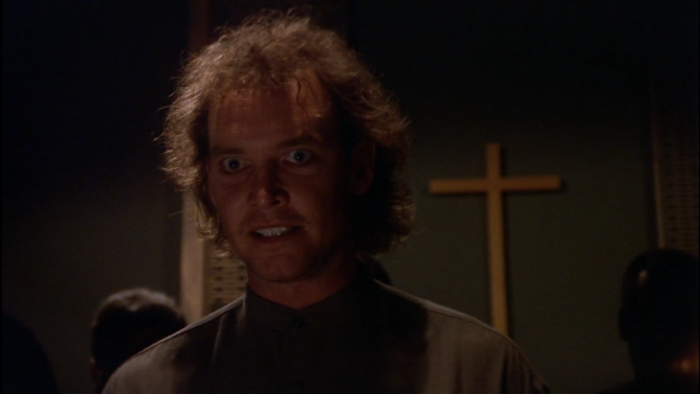
Edward's killer
All of this points to some tragically misguided thinking on Brother Edward's part, to the extent that if we were talking about a real-life scenario, I'd be questioning whether Edward was really a Christian.
A quick read of the account of Jesus' time in Gethsemane in Matthew's gospel makes it pretty clear that he really doesn't want to go through with being crucified. Here's an excerpt:
He took Peter and the two sons of Zebedee along with him, and he began to be sorrowful and troubled. Then he said to them, “My soul is overwhelmed with sorrow to the point of death. Stay here and keep watch with me.”
Going a little farther, he fell with his face to the ground and prayed, “My Father, if it is possible, may this cup be taken from me. Yet not as I will, but as you will.”
— Matthew 26:37-39
Edward is right, Jesus didn't have to be there when the soldiers came. Edward suggests that Jesus could have delayed his arrest by a few days by legging it, but he's selling Jesus short here. Later on in the chapter, when Jesus is actually being arrested, Peter draws his sword to defend him. Jesus tells him to put it away, saying, "Do you think I cannot call on my Father, and he will at once put at my disposal more than twelve legions of angels?" Being arrested and crucified is, for Jesus, entirely optional.
But what's bothering Jesus, what's making him look for a way out, is not really the "pain and death" as Edward suggests. The real source of Jesus' anguish is the "cup", which is an Old Testament way of talking about God's wrath. What so terrifies Jesus is not the thought of dying (though I'm sure that wasn't easy either), but the thought of dying in our place, of experiencing God's wrath and judgement that we deserve. This is why he came, to bear our sins in our place, so we don't have to. And so — and this is the bit that Edward seems to have misunderstood — Jesus is struggling with the cost of achieving something we can't, namely putting us right with God. Edward doesn't need to worry about whether he could have stayed in the garden of Gethsemane. The entire point is that Jesus has done it so that we don't have to.
This leads Edward in a dangerous direction, because rather than relying on grace, on God's undeserved forgiveness, he relies on works, on earning God's forgiveness by doing the right things. This is clear in a conversation he has with Theo once he's realized who he really is:
Edward: What if I had died, Theo, never knowing what I had been? How can I confess my sins to God if I don't even know what they are? The mind forgets, but the stain remains with the soul. The blood of innocent people is still on my hands. My memories are the creation of somebody else, and my soul is the soul of a killer, and everything that I have done has been a lie.
Theo: That's not true, Edward! You've helped people, cared for people.
Edward: It's not enough. Who knows what other crimes I may have committed that they never found out about, that I don't remember. I am a murderer, Theo. The sins of my former life must be atoned for. There must be justice. I know that now.
(Edward turns to leave)
Theo: Edward! Edward! If you ask God to forgive your sins, he knows what they are, even if you've forgotten. Leave it in his hands.
Edward: Goodbye, Theo.
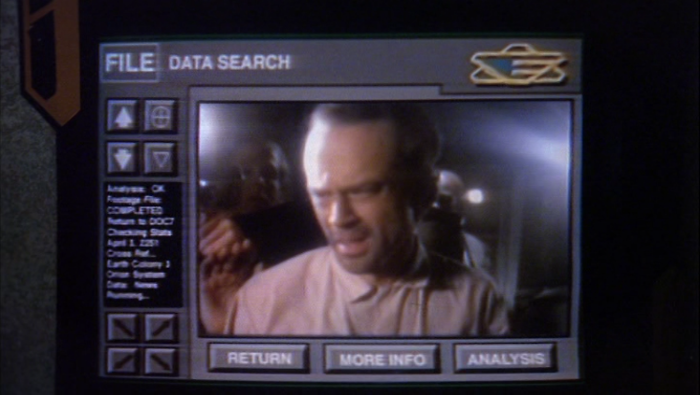
The news report that confirms Edward's real identity
Brother Theo's last line there is probably about he most helpful thing he says at any point in all of B5, but even then arguably he's falling short of the truth. Edward is definitely, and Theo may be, operating under the assumption that in order to remain forgiven, to remain right with God, he needs to keep coming to God and confessing his sins. Now, doing that is a healthy, natural thing for a Christian to do, but it's important not to overlook the fact that being one of God's children is a step change in our status. Christians have been adopted as God's children, and our sins can't change that status any more than they can change who our biological parents are. (If you're reading this wondering if that means if you become a Christian you can live however you want, then the short answer is "Yes, but what you want will change." God is in the business of changing his people, helping us line up more and more with his good pattern.)
But it's clear that Edward doesn't get this. Theo talks about the good Edward has done, and Edward replies with "it's not enough". No, Edward, it isn't, but that's OK because Jesus has paid the price for you, so you can be forgiven anyway. "The sins of my former life must be atoned for. There must be justice." Yes, and that's why Jesus died on the cross, you prize ninny.
At the end of the episode, when Edward is dying, he says "Theo, I'm afraid. Is there enough forgiveness for what I've done?" Here he's using the language of forgiveness, but it seems that he's only willing to think in these terms now that he's done what he thinks was necessary for him to have any claim on that forgiveness.
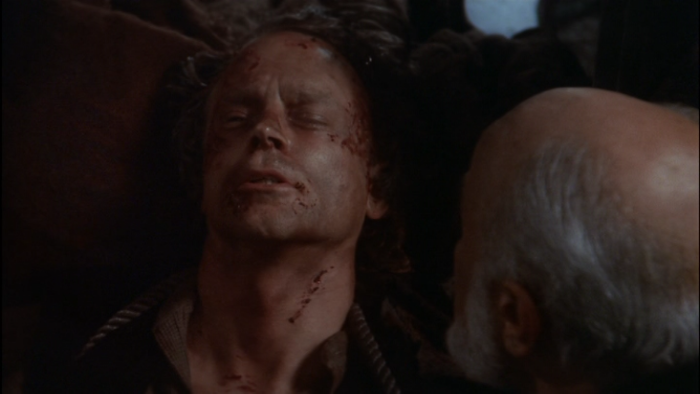
"I always wanted to know if I would have the courage to stay in the garden of Gethsemane. Now I know, Theo, now I know."
We could debate whether, if mind wipes were possible, they would be a right or fitting punishment, but even if someone were to argue that Edward had "got away" with murder, his desire to be the subject of justice is clearly with an eye on eternity, on the "stain" on his soul, rather than any human judgement. But the wonderful news of the Bible is that in terms of how God views us, things are clear. The gospel, properly understood, would have freed Edward from the burden of guilt that he was carrying. To be sure, he'd have had to come to terms with what he'd done, but all it would have taken would have been trust in God's promises for the stain to be removed, once and for all, and placed on Jesus at the cross. Edward, of course, is not real, but in the garden of Gethsemane the terror Jesus felt as he saw his crucifixion looming was, in part, the terror of bearing the punishment for every murderer who's ever turned to God for forgiveness.
Not only is trying to be good enough for God a crushing burden (as Edward discovered), we can never meet God's standard. That's what Edward was trying to do, and like all human beings he failed. Nothing he did could make up for being a murderer, even partly, and by relying on his own actions to bring himself part way he left himself standing condemned. But he didn't need to. Jesus' death is the only thing that can rescue us, but it will rescue us if we ask Jesus to stand in our place and take our guilt away. Jesus offers to scrub away any sin-stain, no matter how big, or how old, and to take our burden away.
Despite this episode being full of tragic misunderstanding of what it means to be a Christian, there is one bright ray in it. I mentioned above the most helpful thing that Theo says, and the most helpful thing he does in Babylon 5 comes right at the end of the episode. He's talking to Captain Sheridan when a man in robes approaches. When he hears his voice, Sheridan spins and stares at him. It's the man who murdered Edward. He's been mind-wiped, and Theo has taken him in, and is sending him back to Earth to train as a monk, as "Brother Malcolm".
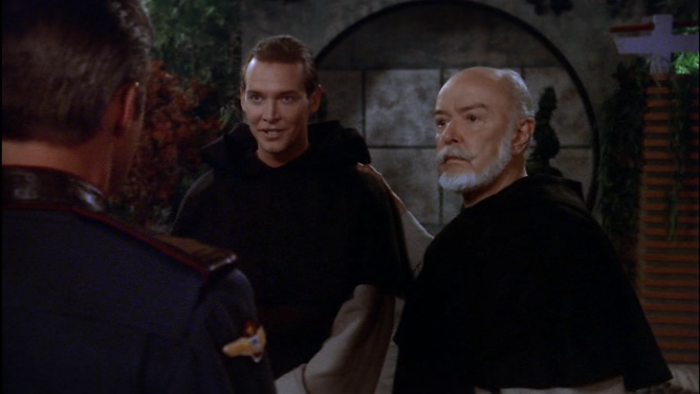
"Brother Malcolm"
When Malcolm offers his hand to Sheridan, he recoils in horror, but Theo, obliquely, tells him that he's forgiven Malcolm for what he did. He's willing to take him in, to treat him as a brother, despite what he did. The great irony of this episode is that Theo treats Malcolm exactly how God would have treated Edward if he'd asked for forgiveness.